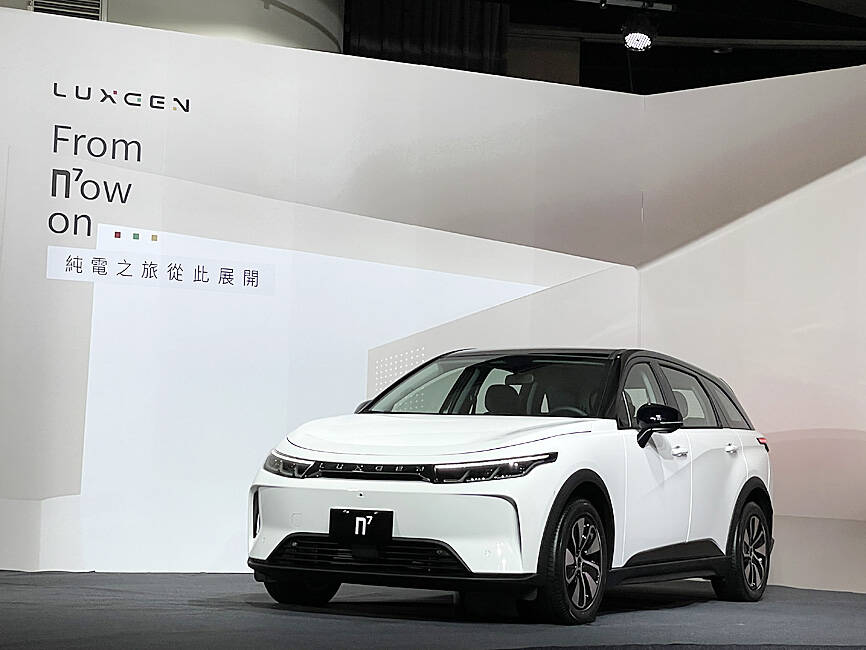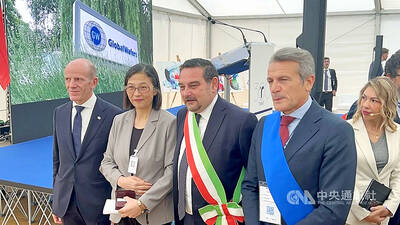Luxgen Motor Co (納智捷汽車), a subsidiary of Yulon Motor Co (裕隆汽車), yesterday said it is again offering a NT$100,000 discount for its entry-level n7 electric vehicle models.
The n7’s price has gone down from NT$1.099 million to NT$999,000, Luxgen said, adding that there are 25,000 preorders for the model.
MG Motor’s electric hatchback, the MG4, entered the market in the middle of last month, with a starting price of NT$990,000.

Photo: Amy Yang, Taipei Times
China Motor Corp (中華汽車), which distributes MG vehicles in Taiwan, said it aims to sell 1,600 MG4s this year.
MG, originally a British brand, was acquired by China’s SAIC Motor Corp (上海汽車) in 2005.
Asked about competition from MG in the entry-level electric vehicle segment, Luxgen president Jeff Lee (李應生) yesterday said he was not worried, given the difference in target consumers.
The n7 series includes multi-purpose vehicles suitable for families, while MG4 is a compact sports car, he said.
Luxgen started taking new orders for the n7 series last month, after smooth delivery at the beginning of the year, Lee said, adding that the company expects to deliver all the first preorders in the third quarter.
With the number of n7 owners increasing to more than 30,000, Luxgen said it plans to double its n7 experience centers this year from five to 10.
Luxgen had sold 1,037 n7 models last month, marking the third consecutive month of monthly sales exceeding 1,000 units, while MG4 sales reached 122 units last month, the latest data for new car sales released yesterday showed.
Toyota Motor Corp’s vehicles, distributed by Hotai Motor Co (和泰汽車) in Taiwan, remained on top, selling 9,689 units last month, down 7.7 percent month-on-month. It has a market share of 23.3 percent.
Tesla Inc outperformed its peers last month, with sales soaring 214 percent sequentially to 3,898 units, giving the US electric vehicle carmaker a 9.4 percent market share and placing second in local car rankings, data compiled by market researcher U-Car showed.
Lexus, the luxury brand of Toyota, ranked No. 3, with sales rising 5.1 percent month-on-month to 2,628 units last month. Lexus has a 6.3 percent market share.
Mercedes-Benz AG, with a 5.7 percent market share, ranked No. 4. It sold 2,376 units, down 11 percent from May.
BMW AG showed the strongest performance, with sales doubling to 2,280 units, boosted by record-high electric vehicle sales of 984 units last month. BMW has a 5.5 percent market share.
Overall, Taiwan’s new car sales last month edged up 0.3 percent to 41,587 units from May, fueled by strong electric vehicle growth, U-Car data showed.
That brought total new car sales during the first half of this year to 232,503 units, down one percent from the same period of last year, it said.

RECYCLE: Taiwan would aid manufacturers in refining rare earths from discarded appliances, which would fit the nation’s circular economy goals, minister Kung said Taiwan would work with the US and Japan on a proposed cooperation initiative in response to Beijing’s newly announced rare earth export curbs, Minister of Economic Affairs Kung Ming-hsin (龔明鑫) said yesterday. China last week announced new restrictions requiring companies to obtain export licenses if their products contain more than 0.1 percent of Chinese-origin rare earths by value. US Secretary of the Treasury Scott Bessent on Wednesday responded by saying that Beijing was “unreliable” in its rare earths exports, adding that the US would “neither be commanded, nor controlled” by China, several media outlets reported. Japanese Minister of Finance Katsunobu Kato yesterday also

‘DRAMATIC AND POSITIVE’: AI growth would be better than it previously forecast and would stay robust even if the Chinese market became inaccessible for customers, it said Taiwan Semiconductor Manufacturing Co (TSMC, 台積電) yesterday raised its full-year revenue growth outlook after posting record profit for last quarter, despite growing market concern about an artificial intelligence (AI) bubble. The company said it expects revenue to expand about 35 percent year-on-year, driven mainly by faster-than-expected demand for leading-edge chips for AI applications. The world’s biggest contract chipmaker in July projected that revenue this year would expand about 30 percent in US dollar terms. The company also slightly hiked its capital expenditure for this year to US$40 billion to US$42 billion, compared with US$38 billion to US$42 billion it set previously. “AI demand actually

Jensen Huang (黃仁勳), founder and CEO of US-based artificial intelligence chip designer Nvidia Corp and Taiwan Semiconductor Manufacturing Co (TSMC, 台積電) on Friday celebrated the first Nvidia Blackwell wafer produced on US soil. Huang visited TSMC’s advanced wafer fab in the US state of Arizona and joined the Taiwanese chipmaker’s executives to witness the efforts to “build the infrastructure that powers the world’s AI factories, right here in America,” Nvidia said in a statement. At the event, Huang joined Y.L. Wang (王英郎), vice president of operations at TSMC, in signing their names on the Blackwell wafer to

Taiwan-based GlobalWafers Co., the world’s third largest silicon wafer supplier, on Wednesday opened a 12-inch silicon wafer plant in Novara, northern Italy - the country’s most advanced silicon wafer facility to date. The new plant, coded “Fab300,” was launched by GlobalWafers’ Italian subsidiary MEMC Electronics Materials S.p.A at a ceremony attended by Taiwan’s representative to Italy Vincent Tsai (蔡允中), MEMC President Marco Sciamanna and Novara Mayor Alessandro Canelli. GlobalWafers Chairwoman Doris Hsu (徐秀蘭) said the investment marked a milestone in the company’s expansion in Europe, adding that the Novara plant will be powered entirely by renewable energy - a reflection of its